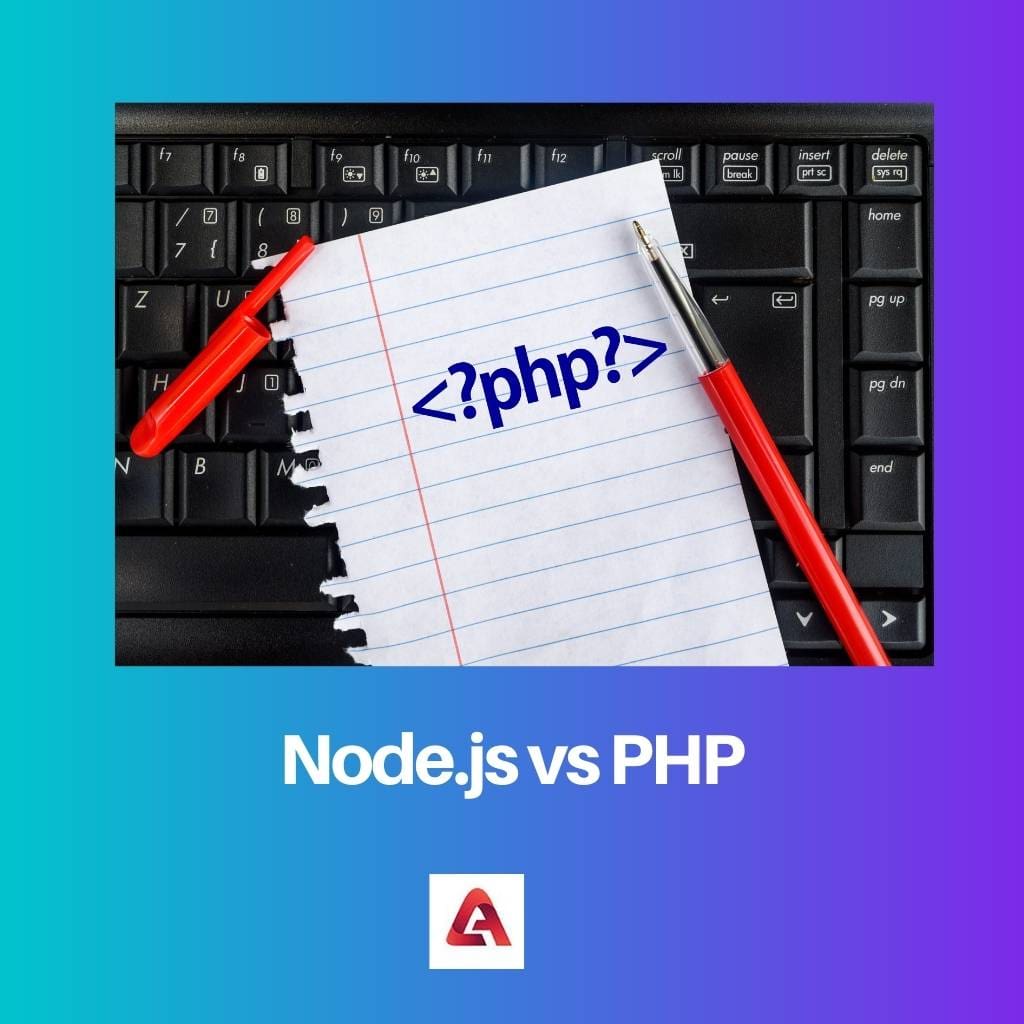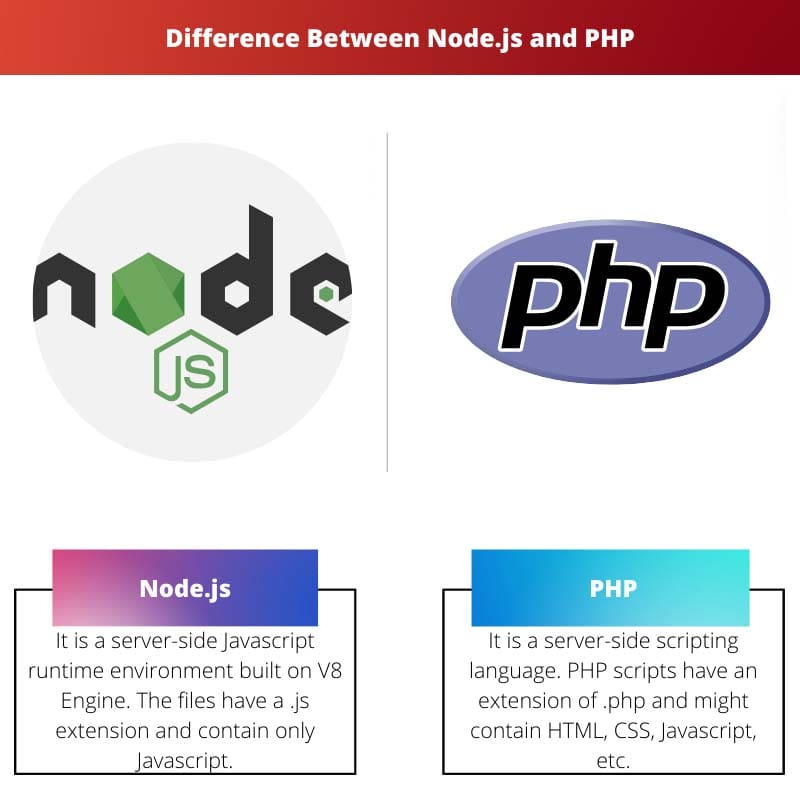In this digital era, there are many programming languages available for a wide variety of projects. Node.js and PHP are two of the most popular language used exclusively for web app development.
Key Takeaways
- Node.js is a server-side runtime environment for JavaScript, while PHP is a server-side scripting language.
- Node.js is designed for scalable, real-time applications, while PHP is better suited for web applications and content management systems.
- Node.js has a non-blocking I/O model, while PHP has a blocking I/O model.
Node.js vs PHP
Node.js is an open-source, cross-platform JavaScript runtime environment that enables developers to build high-performance, event-driven, and scalable network applications. PHP is a popular server-side scripting language that is used to create dynamic web pages and web applications.

Node.js was initially released in 2009 by OpenJS Foundation because the most popular web browser in 2009, Apache HTTP Server, had limited possibilities when it came to concurrent connections.
PHP is a scripting language released in 1995 to serve as a tool for web development. It originally stood for Personal Home Page but now stands for Hypertext Preprocessor.
Comparison Table
| Parameters of Comparison | Node.js | PHP |
|---|---|---|
| Scripting | It is a server-side Javascript runtime environment built on V8 Engine. The files have a .js extension and contain only Javascript. | It is a server-side scripting language. PHP scripts have an extension of .php and might contain HTML, CSS, Javascript, etc. |
| Execution | It uses Asynchronous execution. Asynchronous coding executes all of the code at the same time. | It uses Synchronous execution. Synchronous coding executes the code in sequence, that is, line by line. |
| Performance | It has high performance with an appreciative execution time and lower start-up time. | It has lower performance and slower execution time when compared to Node.js as it uses the synchronous method of execution. |
| Database | Node.js can work with all forms of databases including SQL Databases and NoSQL Databases like MongoDB and CouchDB. | PHP works very well with conventional databases like MySQL and MariaDB. But the process becomes complicated with NoSQL Databases. |
| Modules | Node.js has a poorer library of modules when compared to PHP. But it is developing at a rapid pace. | PHP has a plentiful library of modules compared to Node.js since it was developed many years before Node.js. |
| Application Domain | Real-time applications like video streaming applications and chat applications use Node.js. It is ideal for developing highly scalable server-side solutions. | The CPU-intensive applications use PHP. It is also a good solution for creating websites, blogs, e-commerce sites, etc. |
What is Node.js?
Node.js is a Javascript runtime environment built on Chrome’s V8 engine. It was developed in 2009 when the popular server of 2009, the Apache HTTP server, proved to be inadequate.
Javascript was initially developed to make the websites interactive. With Node.js, you can do more with JavaScript. It can be used as any other programming language.
When designing dynamic single-page applications, it is preferable to use Node.js. It offers fast back-end solutions and is efficient to use for concurrent connections.
Node.js is a flexible option for programmers as it has limited guidelines determining its use. There is no predetermined set of rules or patterns to follow in Node.
What is PHP?
PHP is a general-purpose scripting language geared towards web development. It was developed in 1995.
It was developed for easier web development and maintenance of code. It is used for blogs and e-commerce sites with Content Management System.
Over time, the developers of PHP have fixed the bugs and possible errors which can arise while coding and made it stable.
PHP is perfect for the LAMP stack (Linux Apache, MySQL, PHP). It can be used for programs that require ease of deployment and integration.

Main Differences Between Node.js and PHP
- Since PHP was developed way before Node.js, it has a richer library of modules when compared to Node.js. But, Node.js is also making quicker developments in this area.
- Node.js is ideal for highly scalable server-side solutions. PHP is used in CPU-intensive applications and for websites, blogs, e-commerce sites, etc.

- https://ieeexplore.ieee.org/abstract/document/7023652/
- https://link.springer.com/article/10.1007/s00607-014-0394-9

The historical and technical background about Node.js and PHP is presented in a precise and informative manner. Excellent content.
The historical and technical context indeed provides significant depth to the understanding of these languages.
Absolutely. It’s beneficial to have a well-rounded understanding of both languages and their contexts.
The presentation of real-world applications for both Node.js and PHP gives a practical dimension to the comparison, and it’s very useful.
Absolutely. Understanding the real-world use cases is vital. This article does a great job at making that clear.
Yes, it provides a solid understanding of where each language best fits in the real world.
It’s great to see the technical aspects of Node.js and PHP explained in a way that is accessible. Very informative content.
Agreed. The technical details are presented in a clear and digestible manner, which is highly beneficial.
This article provides a comprehensive overview of Node.js and PHP, giving readers a solid understanding of the intricacies of both languages.
The breakdown of the main differences and what they are ideal for is presented in a very clear and informative manner. A very enlightening read.
The clarity is important. It’s clear that understanding the applications in which each language shines is crucial in making the right choice for projects.
Absolutely. Understanding the strengths of each language is key for making informed development decisions.
The historical context provided about the development of both Node.js and PHP is very insightful. Understanding the origins helps understand the use cases better.
Absolutely. Knowing the origins and the problems they aimed to solve gives a deeper understanding of their capabilities.
The content offers valuable insights into both Node.js and PHP. Understanding the application domains of each language is particularly enlightening.
Absolutely. Understanding their best use cases is crucial for developers.
Agreed. The article provides great clarity about the ideal applications for both Node.js and PHP.
The article effectively communicates the essential differences between Node.js and PHP in a clear and comprehensive manner.
Yes, the clarity in the comparison makes it easier to understand which language is best suited for different types of applications and tasks.
Excellent article that clearly explains the main differences between Node.js and PHP. It’s very helpful to know the main parameters of comparison.
The details about the scripting, execution and performance differences are particularly enlightening.
Yes, I agree. The comparison table provides a great way to understand the key differences.
I appreciate the extensive detail while keeping the language clear and accessible. The technical nature of the topic is handled very well.
Absolutely. The balance between depth and accessibility is impressive.
Yes, it’s a complex topic but the article makes it understandable without sacrificing important details.